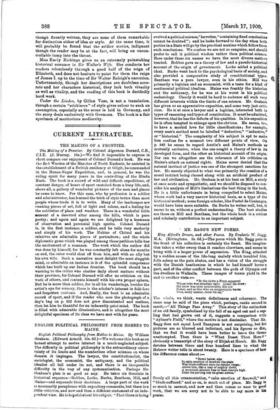• 2112. RAGG'S NEW POEMS.
King Alfred's Dream, and other Poems. By Frederic W. Ragg, M.A. (Rivingtons. 3s. 6d.)—The poem which Mr. Ragg puts in the front of his collection is certainly the finest. His imagina- tion takes a wider sweep than it reaches elsewhere, and seems to bring with it a larger pcwer of expression. The King, attacked by a sudden access of the life-long malady which troubled him, falls asleep as the pain abates, and has a vision of the struggle with the Danish heathenism in which he had himself borne a part, and of the older conflict between the gods of Olympia and the dwellers in Walhalla. These images of terror yield in the end to another vista:— "In the dawn a Form appeared Whose robe was steadfast light. Closer He drew: His brow was calm unutterable, His eye Power, and as One who on tempestuous waves Trod, easily master, came He on."
The .‘ hole, we think, wants definiteness and coherence. The same may be said of the piece which, perhaps, ranks second in merit,—" All Things Pass Away." This story of the extinction of an old family, symbolised by the fall of an aged oak and a sap- ling that had grown out of it, suggests a comparison with " Aylmer's Field," where the motive is not dissimilar. That Mr. Ragg does not equal Lord Tennyson is not surprising, but his pictures are so blurred and indistinct, and his figures so dim, that we feel it would have been better to leave the theme unattempted. Then there is " What Doest Thou Here ?" obviously a transcript of the story of Elijah at Horeb. Mr. Ragg devotes between three and four hundred lines to what the Hebrew writer tells in about twenty. Here is a specimen of how the difference comes about :— 0 Down below, afar In calm emotion of farewell the plain Was blush-suffused unto its distant verge; Above him, like a leap of mighty thrill, A mountain summit rose to flash heaven high Unto the parting sun its great adieus."
Surely all this ornamentation, "calm emotion of farewell," and " blush-suffused." and so on, is much out of place. Mr. Ragg is so much in earnest, and now and then comes so near to good work, that we are sorry not to be able to say more in his praise.
































 Previous page
Previous page